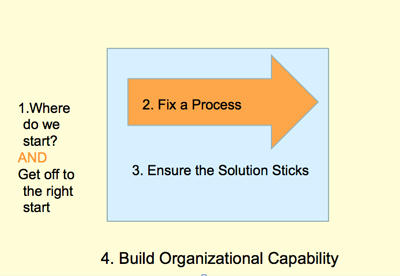If you don’t get off to the right start with a BPM Project, there are all kinds of consequences such as:
- Needing to change process owners mid stream
- Wasting time focusing on the wrong goals
- Not involving the right resources
- Missing critical information and making poor decisions
- “Buying” the technology solution
In one unfortunate situation, the executive group prioritized the key process improvement projects to start on, wrote initial charters and selected the work teams. But the Process Owners for each team were not part of the executive session, did not agree with the charters, and were not sure the projects were going to be successful at this time. So we had to back track to get everyone aligned, to assign executive sponsors and process owners, and to redefine the improvement targets in the charters. We wasted several hours of each team’s time, and the project began on a riskier basis.
The diagram below shows four key elements of a successful BPM organization and this article will focus on # 1. Get off to the Best Start.

Here’s what you need to do to get off to the best start:
- Identify a clear business need
- Develop a charter
- Select an executive sponsor and process owner
- Get baseline data
- Identify the needed cross functional improvement team
Identify a clear business need.
There are many ways to do this, but I encourage organizations to use one of three methods:
- Align with Strategy: See what process improvements are needed to support the strategic plan
- Prioritize several projects on a nine box matrix with the vertical axis showing low to high current process performance and the horizontal axis showing level of market opportunity for the process
- Find an eager executive sponsor and process owner who need to do a process improvement project because it is critical to the success of the business and their division.
Develop a Charter
The charter for the process should contain at least these elements:
- Current challenges within the process
- Customer scorecard
- High level As Is map of the process
- 2-3 Improvement targets given by the executive sponsor and process owners
- Scope
- Baseline metrics and goal metrics
- Vision for the process when it is working well
I find I can build the initial charter with the executive sponsor, process owner, and project lead in 90 minutes. Then we iterate it as we Fix the Process. The charter is like the US Constitution; it doesn’t remain the same; it changes over the life of the project as we learn new things, such as what the customer says and what quantitative data we can gather. The team constantly adjusts the charter, but checks in with the sponsor and process owner in doing so.
The charter provides a framework and focus for the team and their process improvement work. The improvement targets and vision are the goal, but they may be revised or added to as the team gathers information from the customer and quantitative data.
Select an Executive Sponsor and Process Owner
I used to think that a sponsor was all you needed for a BPM Project, but I found out the hard way – you need both.
Let’s talk about the criteria for each role:
An Executive Sponsor is:
- The executive with authority over process
- Personally motivated by the business need behind this effort
- Can influence outside suppliers or organizations
- Advocates for BPM with this project and across the full organization
- Sees BPM applications enterprise wide
The Process Owner:
- Sets Improvement targets and vision; identifies the team
- Challenges policy and practices
- Has resources to support the BPM effort
- Advocates for BPM; influences key leaders in the organization
- Is accountable for and drives execution of transformation
- Monitors the process and leads continuous improvement for process
(A more detailed analysis of these two roles is available on my blog: Getting Started with BPM: Find the Right Process Owners Part 1 and Part 2.)
The Executive Sponsor has the highest authority but it is unlikely he will pay ongoing attention to this process. Instead she may have several process owners under her and each needs to be responsible at an executive level for improving the process, driving implementation and then ensuring continuous improvement. The sponsor would not have the bandwidth to do all that, and projects could be implemented and then be neglected.
Get Baseline Data
During the charter meeting baseline data is suggested by the executive sponsor and process owner. You need to help them identify it based on the improvement targets. I suggest one to two pieces of baseline data per improvement target. Usually the quantitative information for the data will not be available in that meeting and the team will have to go gather it. In fact, teams find it hard to get this data because they may have to collect it manually or mash together some reports to figure it out. Most companies have extensive financial and personnel data but very little process data.
The executive sponsor and process owner suggest the type of data to be gathered and the team collects it. Get started on this data gathering early with the team as it will take a while, and it is critical. Eventually the success of the project will be determined by comparing the metrics after improvements to the baseline data, so make sure you gather it. The baseline data will also give you clues about other analytical data you will want to get to determine root causes of problems and to indicate where the biggest gaps are in today’s process.
Identify the needed cross-functional improvement team
Who should be on the team? The high level As Is map in the charter tells you. You need to have employees and managers who do all the tasks in the high level map. You also want to think about representation from different regions. Other roles you need are IT and a maverick; two optional roles on the team are customer and supplier.
Some companies use a business analyst to interview subject matter experts to get the detailed swim lane current state model, and then analyze that model and redesign it. I really encourage organizations to form an ongoing cross-functional team to do the business process improvement project. The advantage of a team is that employees get to view the end-to-end process together, air different points of view in one room and work them out, get aligned behind the improvement targets and committed to executing on the optimized process together.
Start with all five of these elements and you will be off to the best start. If you’re missing any elements, make sure you go back and get them as you work through the process. I have had teams who had left out key team members and they recognized it and added them quickly. I have had teams with the wrong process owner; sometimes they changed process owner mid stream or they recognized another process owner would be necessary for implementation and ongoing monitoring. I have had a few colleagues who said their company would not tolerate a charter. If that’s the case, I say don’t call it a charter, but define all the elements and document them. If you have all the elements, you’re off to the best start.

















